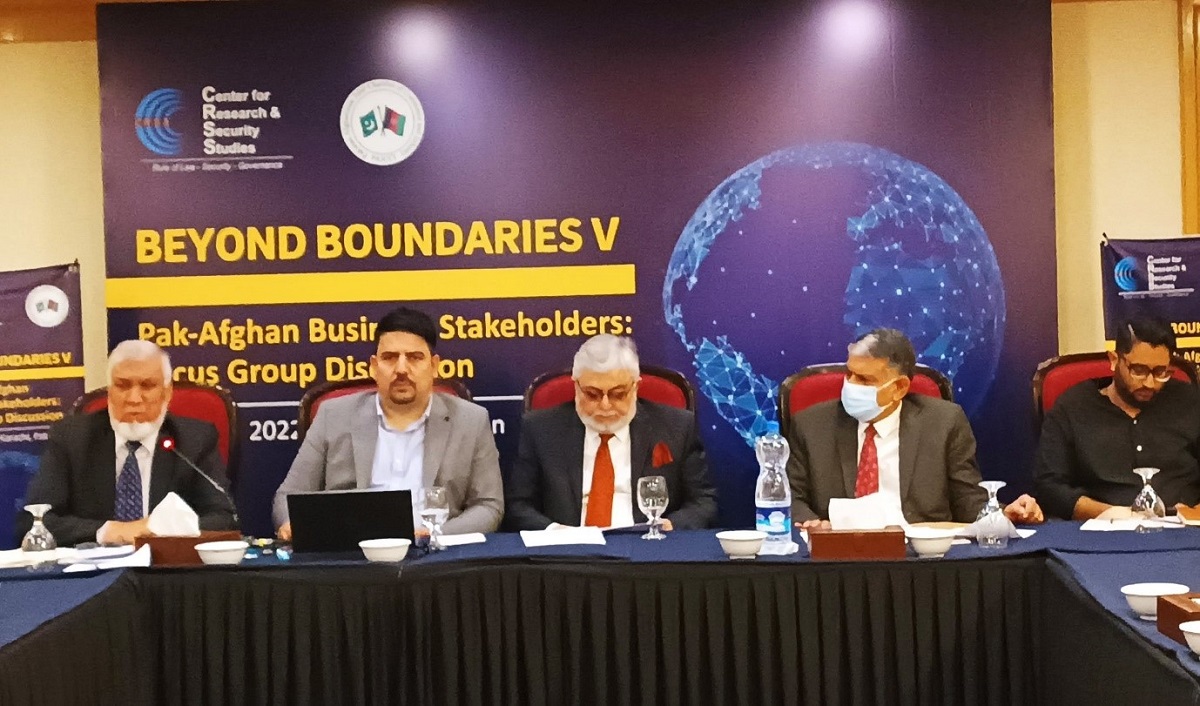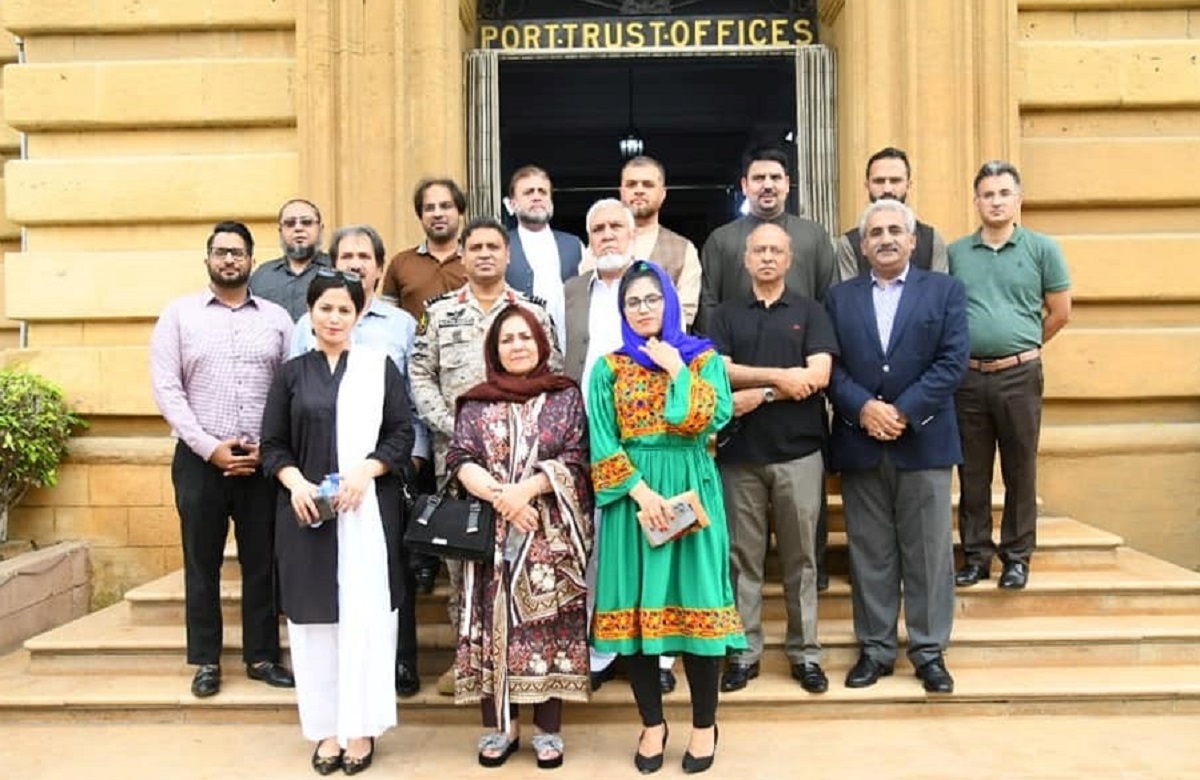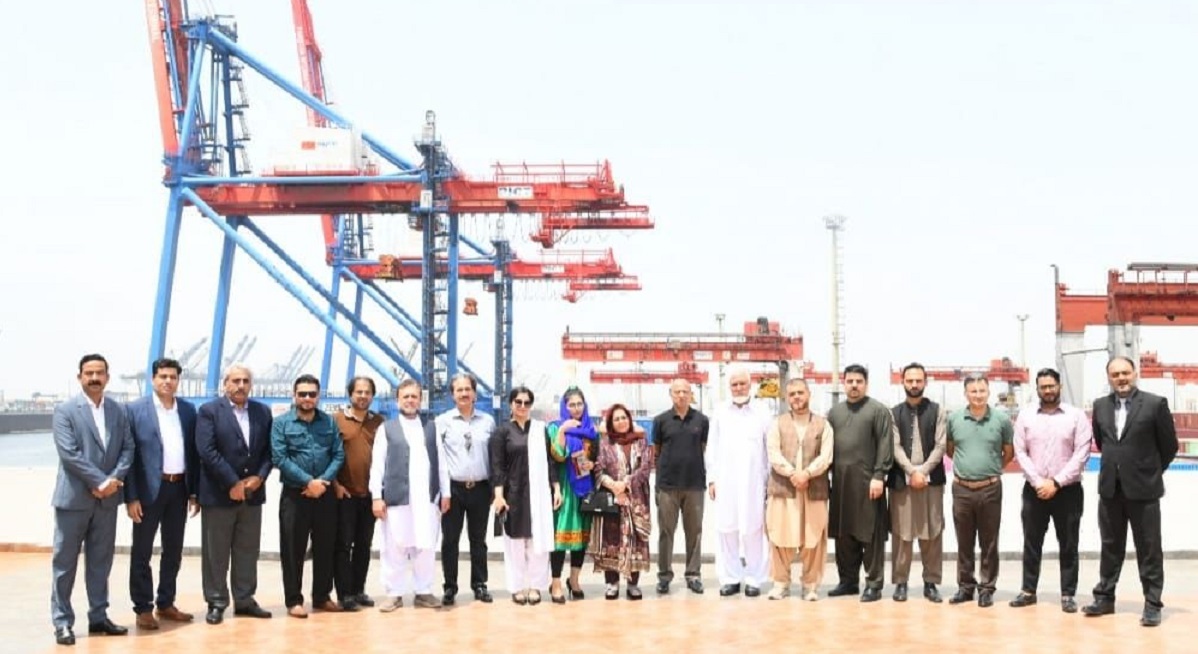Besides its focus on and mandate to positively influence the relationship between Pakistan and Afghanistan on the issues of mutual concern, Beyond Boundaries V also endeavors to connect Afghan businesspersons with the relevant Pakistan government stakeholders to deliberate operational challenges of trade and transit trade, identify and propose policy interventions needed for resolution and generate bottom-up demand to address issues detrimental to an economic relationship.
In this regard, the Center for Research and Security Studies organized a Focus Group Discussion (FGD) on August 02 – 03, 2022, in Karachi with the agenda informed by the aforementioned objective.
The visiting Afghan delegation comprised former Deputy Economic Minister and policy expert on trade agreements, traders, businessmen, entrepreneurs, and officials from the Afghan Chamber of Commerce and Industry (ACCI), while the participants from Pakistan included senior officials from the Pakistan FBR and Customs, Trade Development Authority of Pakistan (TDAP) which is operating under the Ministry of Commerce, Karachi Port Trust (KPT), Pak-Afghan Joint Chamber of Commerce and Industry (PAJCCI), as well as representatives from bounded courier services. The detailed list of participants is given below.
The discussions had during this interaction mainly focused on:
- Impediments in bilateral and transit trade and how the government of Pakistan can facilitate the Afghan traders in this regard
- Policy-level challenges in the renewal, and implementation of APTTA (Afghanistan-Pakistan Transit Trade Agreement) under WTO (World Trade Organization) rules and regulations
- Issues of pending containers at Karachi ports, and cross stuffing
- Economic empowerment of Afghan businesswomen and entrepreneurs
- Prospects for further economic engagement between the two countries
Recommendations
The following recommendations emanated from FGD and sideline meetings of the visiting Afghan delegation with Pakistan government authorities:
- Ministry of Commerce (Pakistan) should initiate talks with the Afghan government to renew Afghanistan-Pakistan Transit Trade Agreement (APTTA) soon.
- Government of Pakistan should provide relaxation on business visas. In case of rejection, the applicant’s visa fee should be reimbursed.
- Committees should be formed on both sides of the crossing points to deal with day-to-day logistical issues.
- Bounded carriers should charge the customers per kilometer and avoid surcharges.
- Karachi International Container Terminal (KICT) should extend the number of free demurrage days to 14 – 20 days.
- A joint committee should be formed at national and custom levels to devise a mechanism for the detention, clearance, and utilization of pending containers.
- Flights should be initiated between Kabul and Karachi, since economically, Karachi is the most feasible route.
- Train service should be initiated between Peshawar and Kabul for transit as it is cheaper and cost-effective
- Ministry of Commerce (Pakistan) should engage and connect Afghan businesswomen with their Pakistani counterparts for ideas, information sharing, and business opportunities. In this regard, open markets and exhibits should be held in Pakistan for the Afghan businesswomen as the market in Afghanistan is not conducive for them at the moment
- Increment fee on tracking devices should be reduced (but that too is contingent upon the renewal of APTTA)
- The shipping lines should increase the number of free detention days.
- The security deposit for Afghan transit cargo containers should be reduced
Day One – Focus Group Discussion
The discussions had on day one, August 2, 2022, mainly focused on custom laws, impediments in bilateral and transit trade due to the non-recognition of the Taliban government in Afghanistan, lack of capacity on both sides, and the barter trade mechanism.
The Director General, Trade and Transit Karachi, Mr. Iftikhar Ahmed, stated that as far as custom laws are concerned, they are very comprehensive, and consignment-to-consignment issues are easily resolved. However, the problems persist since the government in Afghanistan remains unrecognized. Mr. Ahmed further said that to discuss and formulate policies on bilateral trade, Pakistan must engage the formal authorities in Afghanistan. He added that given the current economic and governance crisis, the Taliban must prioritize appointing technocrats in the new government. On the issue of electronic trackers, he highlighted that the devices have to be imported and that global inflation has affected these transactions.
APTTA serves as a guiding document for Pak-Afghan trade and transit, but since 2010, it has not been updated. Mr. Mozammil Shinwari, Executive Director, Organization for Economic Studies and Peace (OESP), highlighted that APTTA can be updated only if the Taliban government gets recognized. “However, in the absence of a formally recognized government in Afghanistan, Pakistan has unilaterally facilitated and ensured the smooth running of trade and transit – and that is commendable”, he acknowledged.
On barter trade, Mr. Khan Jan Alokzai, Co-Chairman, PAJCCI, said that if the trade is at a standstill, it means that we need to bring change into policies, “the mechanism should be shared with the Afghan government authorities and must be integrated into the national policy framework”, he said. He also praised the cooperation of the Pakistani government on the regulated traffic flow at Torkham. “But there are issues such as rejection of visas. If 100 business personnel apply, only 30 make it through”, he added. The economic assistance to Afghanistan is currently serving as a pillar. The country’s purchasing power has been reduced from USD 15 billion to USD 5 billion. But, on the other hand, new deals on coal export have given the people a slight margin of hope. “I believe this is a win-win situation for both Afghanistan and Pakistan”, he said.

Another issue that Mr. Alokzai highlighted was the price hikes by the bounded carriers and transit fees. He said the Ministry of Commerce, Pakistan, can play a role in it, and bounded carriers should provide some relief on a consignment-to-consignment basis.
Ms. Nahid Hakimi and Ms. Taiba Mashal Vaizi, both running businesses in Afghanistan, also spoke on the occasion. They thanked CRSS for including women in the bilateral and transit trade discourse. Ms. Faizi requested that Pakistan’s Ministry of Commerce should arrange regular meetings between the Afghan and Pakistani women in business and commerce so both sides can discuss ideas, share information, and explore further opportunities. Speaking on the current situation of Afghan businesswomen and entrepreneurs, she stated that the market is not welcoming for them at the moment and the businesses are in limbo. “In such a situation, we would appreciate it if the government of Pakistan facilitates us in arranging exhibitions in different cities of Pakistan so we can market our products and create opportunities for ourselves”, she concluded.
Emphasis was made on the dire need for technocrats in the Afghan government. Mr. Mozammil Shinwari, who is also the ex-deputy minister of commerce (Afghanistan), said that the Taliban must realize the governance loophole that is maximizing day by day due to the lack of skilled personnel in the current cabinet, if this persists, the economy and social infrastructure would debilitate further.
Mr. Zubair Motiwala, Chairman of PAJCCI Pakistan, noted that Afghan import payments are made through third countries, but Pakistan is not one of those countries yet. “If we are talking about the lack of capacity in the Afghan business and commercial arena, then there are shortcomings at Pakistan’s end too – we also need to maximize our threshold for dealing with similar transactions. With coal, for instance, we are saving a tremendous amount of money, so, I believe that the same can happen for other products too” he opined. Mr. Motiwala further said that Pakistan’s current account and trade account deficit have reduced its exports, hence, the trade with Afghanistan has ultimately been affected. “We have lost 35% of our business with Afghanistan. The government of Pakistan needs to adopt a pre-emptive approach”, he stated.
Mr. Jawaid Bilwani, President of PAJCCI, said that the Russia-Ukraine war has repercussions on global trade, but Pakistan and Afghanistan being neighbors can make the most at the moment as their geographical proximity enables them to do so. “We must untap our potentials given the status quo. After the coal deal, we must move to other items and resources”, he asserted.
Highlighting Pakistan’s facilitative mechanism in trade and transit, Mr. Arbab Qaiser, Director General – Trade and Transit (Torkham), underscored that Pakistan is trying its best to regulate the flow of aid and goods from other countries to Afghanistan. He also mentioned that ample wheat is coming from India and Pakistan Customs is playing an integral role in its smooth delivery to Afghanistan. Besides, regular meetings between the authorities on both sides of the border are held to facilitate traders as per the norm and needs. He also ensured that issues on tariffs would be resolved soon.
On the issue of pending containers, Mr. Ajmal Safi, board member of PAJCCI remarked that due to excessive detention charges, Afghan containers are stuck at Karachi ports, and the charges are more than the actual goods. He stated that to address chronic challenges such as containers’ detention and utilization, and the present vexing issues related to payments for import and export, stakeholders on both sides should solely stick to the legal framework, and efficacy in action is required. “Hawala payments are not a sustainable solution for transactions on import and export. Pakistan must persuade and encourage the Afghan authorities to switch to sustainable procedures and familiarize themselves with the technicalities of modern trade. We do not need to reinvent the wheel in Afghanistan. We have the mechanism available in front of us”, he inferred.
At the end of the FGD, all participants gave consensus on the recommendations put forth and reaffirmed their commitment to strengthening economic connectivity between the two neighboring countries by sharing the propositions with relevant offices on both sides.
Day Two – Sideline Meetings and Exposure Visits
On day two, August 3, 2022, Afghan delegates were given a tour of Karachi Port Terminal (KPT) Head Office, Karachi International Container Terminal (KICT), and South Asia Pakistan Terminal (SAPT), and were apprised of Pakistan’s on-ground facilitation and mechanisms for trade and transit with Afghanistan and other countries. Besides, sideline meetings were held with the respective officials to discuss issues of cross-stuffing and transshipment.

KPT GM Operations Rear Admiral Zubair Shafique and Traffic Manager Azam Memon briefed the delegation about the available facilities at Karachi Port and extended their full support in ensuring the smooth movement of Afghan transit cargo.
Captain Rashid Jamal, CEO of SAPT, assured the Afghan delegation that SAPT would consider the requests from Afghan traders on an individual basis, and would try to facilitate as much as possible on free demurrage and other logistical matters.

Mr. Khan Jan Alokzai thanked KPT and Pakistan government representatives for Pakistan’s role in bilateral trade and transit, especially under current circumstances when the overall global trade is experiencing unprecedented times.
Authorities at both ports and KPT ensured that they would take up the issues discussed in the FGD, especially on cross stuffing and transshipment, and forward CRSS’ policy recommendations to the higher offices for consideration and implementation.
